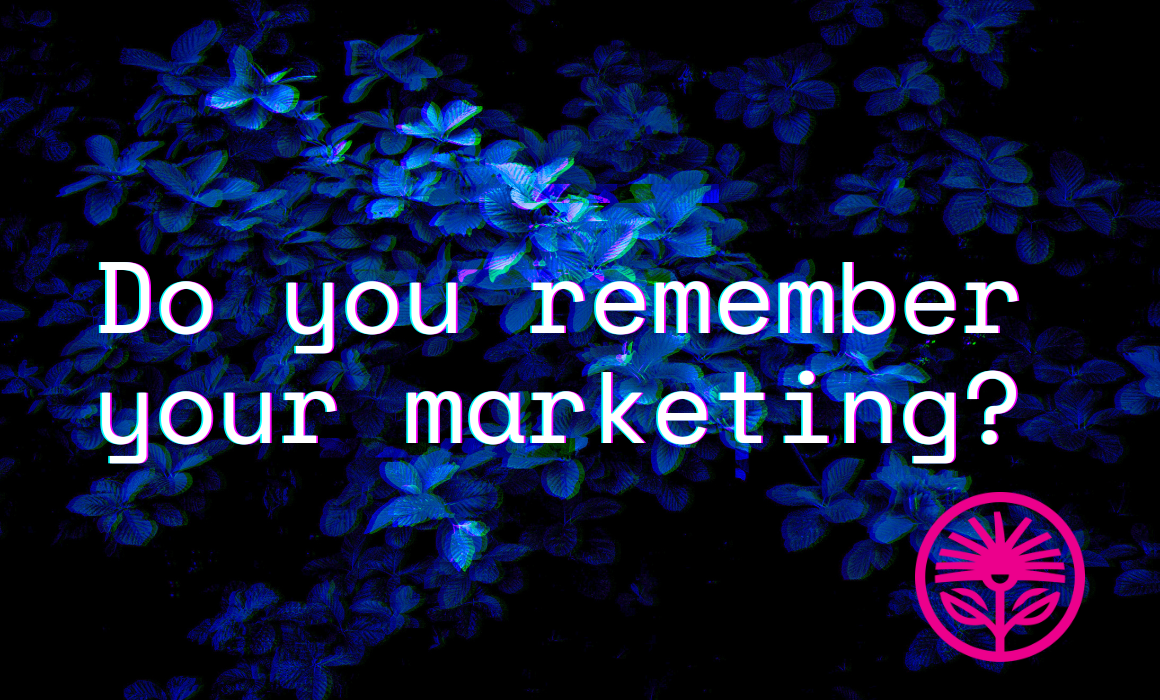Do you remember your marketing? — Kelford Labs Weekly
If you don’t, they won’t.

Remembering your marketing
“The more we remember, the better we are at processing the world. And the better we are at processing the world, the more we can remember about it.”
— Joshua Foer, Moonwalking with Einstein
At the beginning of our process with a client, we take their “measurements.”
We use our signature 9 Value-Defining Questions to determine their unique value, how they deliver it, and how they can demonstrate it.
But before we ask those questions, we start with a simple one:
“How are you describing the value of your product, service, or business today?”
This isn’t meant to be a trick question, but occasionally it’s confronted as if it is. Because many, many entrepreneurs, business leaders, and even marketers don’t have a ready answer.
They might stumble over some wording or sit silently, stumped.
Is that because they don’t know what makes their company valuable to their ideal clients?
No, it’s because they don’t have the right words to describe it.
They feel it. They know it. They’ve seen it.
But they don’t know how to say it.
What’s missing is the phrasing, the formatting, the finessing required to make their marketing messages memorable.
Which means, when it comes time to deploy their marketing, like when we ask them to define their value, or when someone says, “So what do you do?”, they get stuck.
That’s no problem when I’m asking, because I’m a pretty sympathetic audience and I know they have real value to offer.
“What you don’t know may not hurt you, but what you don’t remember always does.”
— Gerald Weinberg, The Secrets of Consulting
But when a prospect asks them what they do, or what sets them apart, and they don’t know what to say, that’s a real problem.
Because that person, that prospect, doesn’t know they have value to offer, they only know that, when they asked about it, they didn’t get a good answer.
So instead of remembering what makes the business special, they leave the interaction remembering nothing.
This is why it’s so important that we make our marketing memorable.
So that we remember it.
Making it memorable
“Focus is scary—until you realize that it only means turning your back on markets you could never have anyway.”
— Christensen & Raynor, The Innovator’s Solution
So how do you make your marketing memorable?
The first step is focus.
If you’re trying to describe what makes you special or unique or valuable and you find yourself using the word “and” more than once, you’re already in trouble.
That’s a one-way ticket to the “buffet problem,” where we become known for doing a little bit of everything but none of it very well.
Instead we’ve got to focus, focus, focus on the single thing that sets us apart. The one thing we do better than anyone else ever could because of our unique combination of experiences, interests, and expertise.
We can only expect our prospects to remember one thing about us, and that’s either going to be the one thing we want them to remember, or the fact that we had nothing interesting to say (because we said too much).
“In addition to making your message simple, try to make it memorable. Put your ideas in verse if you can; they will be more likely to be taken as truth. The aphorisms were judged more insightful when they rhymed than when they did not.”
— Daniel Kahneman, Thinking, Fast and Slow
Then, once we’ve identified the one thing we want to focus on, we want to turn that thing into something that can be easily retained.
We can make it rhyme, or make it rhythmic. We can make it simple and structured.
We can make it colourful, playful, or surprising.
Our friend Gavin, for instance, could respond to the question, “What do you do?” with a simple category, like, “I run a fractional CTO consultancy.”
Instead, his website says, “I build the tech and teams that grow your business.”
The Sobey School of Business could promote their Executive Professional Development programs with a long-winded explanation of how professional development can improve your job prospects or accelerate your career advancement.
Instead, their promotions say, “Don’t move on. Move up.”
My own business could promote our services by saying, “We’re a marketing consultancy,” but instead we say, “We show experts the way to always knowing what to say.”
The rhythm, the rhyming, it’s not just for them, the customer or the prospect.
It’s for you, it’s for me, it’s for the marketer or the entrepreneur, so that when we’re asked what we do or what sets us apart, the words come easily.
Because we remember them.
Because we made them memorable.
Deploying it memorably
“Nobody reads ads. People read what interests them. Sometimes it’s an ad.”
— Howard Gossage
Having phrases ready to go, that are designed to be remembered, means you don’t have to struggle with the words when someone asks you what you do.
But that doesn’t mean all we have to do is spit out a stock phrase we’ve memorized.
We always want to deploy our messages memorably.
We want to subtly customize them to the person who’s asking or the medium in which we’re promoting ourselves.
What having a memorable phrase allows you to do is focus on the person in front of you or the prospect you’re targeting and adjust your message to fit their unique need or opportunity.
So when someone asks me what I do, I might not immediately blurt out a catchphrase or a slogan. Instead, I’ll probably ask them a question back, like:
“Have you ever been asked what you do and not known what to say? Or have you ever tried to explain what your product does and gotten stumped trying to describe what makes it special? That’s what I do. I show experts the way to always knowing what to say.”
The idea is to meet the moment, and match the motivation of the person you’re talking to or targeting.
You want to slot your message into the right category in their mind, so that when they need the type of thing you do, sometime in the future, they’re easily able to retrieve the information.
I don’t want to end up in the general bucket labeled “marketers” in my prospects’ minds. I want to create the category of “specialists who help me describe my value,” and cement my business as the archetype of that category.
Whatever it is you do, and whomever it is you’re talking to or targeting, that’s what you want to do, too:
Customize your message to fit the moment and the need, and make it memorable enough to make it last until they need you.
“Keep in mind E.B. White’s warning, ‘When you say something, make sure you have said it. The chances of your having said it are only fair.’”
— David Ogilvy, Ogilvy on Advertising
I get it, this can feel a little cheap, a little trite, a little contrived.
But that’s because you think about this stuff all the time. Your prospects barely think about you at all (if at all).
Our job is to make ourselves memorable, to make our messages meaningful.
To repeat ourselves as often as necessary to get our messages retained and retrieved at the right moment.
Don’t worry about wearing your messages out. There’s no such thing as a worn-out message, only a message that works so well everyone remembers it.
Which is the whole goal. Not to replace your messages every day with something new and novel.
But to cement your business within a category you create in the mind of your customer.
By remembering your own messages, because you made them memorable.
So you can deploy them at the right moments, memorably.
Kelford Inc. shows experts the way to always knowing what to say.



